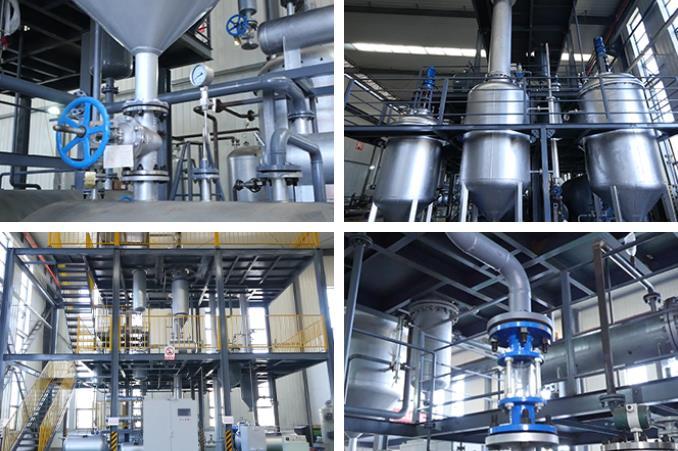Step-by-Step Guide to Starting a Waste Oil Recycling Plant

Waste oil recycling is a crucial industry for environmental sustainability and resource conservation. It transforms discarded oils (like used motor oil, cooking oil, and industrial oils) into valuable products, reducing pollution and conserving natural resources. If you're considering venturing into this rewarding field, here's a step-by-step guide to help you get started:
1. Conduct Thorough Market Research:
Assess Demand: Analyze the local demand for recycled oil products (e.g., base oils, heating oil, biofuels). Identify potential customers (e.g., industrial plants, transportation companies, heating oil distributors).
Study Competition: Evaluate existing competitors in your region. Analyze their strengths and weaknesses, pricing strategies, and market share.
Identify Potential Suppliers: Locate reliable sources of waste oil, such as automotive repair shops, restaurants, and industrial facilities. Establish strong relationships with suppliers to ensure a consistent and reliable supply.
2. Develop a Business Plan:
Define Your Mission and Vision: Clearly articulate your company's goals and objectives.
Choose a Business Structure: Select the most suitable legal structure (e.g., sole proprietorship, LLC, corporation).
Outline Your Services: Determine the specific types of waste oil you will recycle and the products you will produce.
Estimate Costs: Project startup costs (equipment, land, permits, licenses), operating expenses (labor, utilities, transportation), and potential revenue.
Develop a Financial Plan: Secure funding through loans, investors, or personal savings. Create a budget and cash flow projections.
3. Obtain Necessary Permits and Licenses:
Environmental Permits: Secure permits from relevant environmental agencies (e.g., EPA, state environmental departments). These permits will outline environmental regulations and waste disposal requirements.
Business Licenses: Obtain the necessary business licenses and permits from local authorities.
Zoning and Land Use Approvals: If you plan to operate from a specific location, ensure it complies with local zoning regulations and land use restrictions.
4. Acquire and Install Equipment:
Select the Right Equipment: Choose appropriate equipment based on the types of waste oil you will process and the scale of your operation. Essential equipment may include:
Storage Tanks: For holding incoming waste oil and processed products.
Dehydration Systems: To remove water from the waste oil.
Filtration Systems: To remove contaminants and impurities.
Distillation Units: To separate and purify the oil components.
Install and Test Equipment: Ensure proper installation and conduct thorough equipment testing to ensure safety and efficiency.
5. Hire and Train Staff:
Recruit Qualified Personnel: Hire skilled operators, technicians, and maintenance personnel with experience in waste oil recycling.
Provide Comprehensive Training: Train employees on safety procedures, equipment operation, environmental regulations, and quality control measures.
6. Establish Quality Control Procedures:
Implement Quality Control Measures: Implement rigorous quality control procedures throughout the entire recycling process to ensure the purity and quality of your products.
Conduct Regular Testing: Regularly test the quality of incoming waste oil and the final recycled products to meet industry standards and customer requirements.
7. Market Your Services:
Develop a Marketing Strategy: Create a marketing plan to reach potential customers, including:
Networking: Attend industry events and build relationships with potential clients.
Advertising: Utilize online and offline advertising channels.
Public Relations: Engage in public relations activities to enhance your company's image and build trust.
8. Focus on Environmental Sustainability:
Minimize Environmental Impact: Implement environmentally friendly practices, such as minimizing energy consumption, reducing water usage, and properly disposing of waste materials.
Comply with Environmental Regulations: Ensure strict compliance with all environmental regulations and waste disposal requirements.
9. Continuously Improve:
Monitor Performance: Regularly monitor key performance indicators (KPIs), such as production volume, operating costs, and customer satisfaction.
Seek Continuous Improvement: Identify areas for improvement and implement strategies to enhance efficiency, reduce costs, and improve product quality.
10. Build Strong Customer Relationships:
Provide Excellent Customer Service: Offer exceptional customer service to build long-term relationships with clients.
Address Customer Concerns: Promptly address customer concerns and resolve any issues that may arise.
Starting a waste oil recycling plant requires significant investment, careful planning, and a strong commitment to environmental sustainability. By following these steps and adhering to industry best practices, you can establish a successful and environmentally responsible business that contributes to a cleaner and more sustainable future.
- Art
- Causes
- Crafts
- Dance
- Drinks
- Film
- Fitness
- Food
- Games
- Gardening
- Health
- Home
- Literature
- Music
- Networking
- Other
- Party
- Religion
- Shopping
- Sports
- Theater
- Wellness


